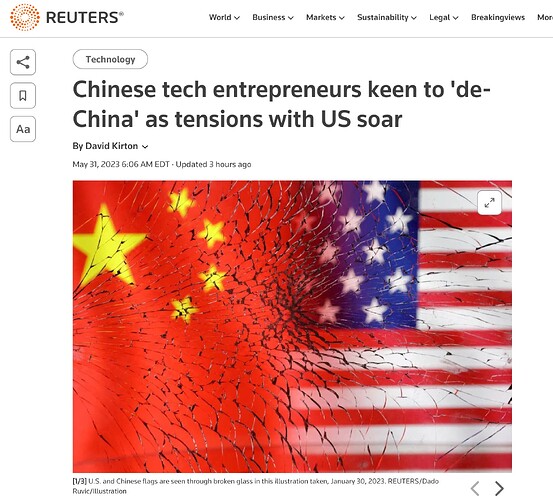-
由于美中贸易紧张局势升级,中国科技企业家在向美国扩张时面临越来越多的阻碍。许多公司通过在海外设立总部来应对,但一些企业主现在觉得有必要获得海外永久居留权或公民权,以避免对中国公司的遏制和偏见。
-
七名来自中国大陆的科技企业家,其中大部分在海外接受教育,正试图在其他地方获得永久居留权或公民身份,其中大多数人正在探索香港、加拿大、日本、美国和新加坡等地的选择。其中三人同意只用他们的英文名字,而其他人由于担心中国国内的影响而要求完全匿名。
-
来自深圳的Ryan拒绝透露他的姓氏,他说他的三年期软件创业公司已经达到了在美国扩张的程度,但他对美中贸易摩擦和对越来越多的中国公司的限制感到失望。他正试图在另一个亚洲国家获得永久居留权,以避免这些问题。
-
自特朗普执政以来,美中关系紧张,美国对华为征收关税和制裁,而中国则阻止关键行业使用美光科技的产品,并寻求对外国咨询公司和尽职调查公司进行管制。
-
美国的政治叙事表明,所有中国公司都与中国政府和中国共产党交织在一起,并接受其指示,这为希望在美国经营或获得资金的中国公司创造了一种敌对气氛。
-
中国外交部认为,一些西方国家正在将技术政治化,为正常的技术和贸易合作制造障碍,这将对全球技术进步和经济增长产生不利影响。
-
在习近平主席的领导下,中国的企业家们对国内市场已经感到失望,并希望将业务扩展到国外。北美生态系统研究所的克里斯-佩雷拉(Chris Pereira)看到,希望转移到国外并不再强调其中国身份的公司的询问有所增加,例子包括申银万国和PDD控股公司。
-
企业家们对中国政府支持私营企业的表示不以为然,并对公民自由的丧失感到担忧。此外,与中国共产党有联系是许多人不愿意迈出的一步。汤米是一名企业家,在政府的审查要求变得过于频繁和侵扰之后,他已经搬到了国外,现在正在建立一个新的创业公司,最终目标是搬到美国。
-
由于华盛顿和北京之间的不信任,移居美国变得更加困难,汤米最近被美国海关官员详细询问,为什么他有一个美国银行账户。美国海关和边境保护机构没有对评论请求作出回应。
-
Chinese tech entrepreneurs have faced increasing impediments to expanding into the U.S. due to escalating U.S.-Sino trade tensions. Many firms have responded by setting up headquarters overseas, but some business owners now feel the need to gain permanent residency or citizenship abroad to avoid curbs and biases against Chinese companies.
-
Seven tech entrepreneurs from mainland China, most of them educated overseas, are attempting to gain permanent residency or citizenship elsewhere, with most exploring options such as Hong Kong, Canada, Japan, the United States and Singapore. Three of them agreed to be identified by their English first names only, while the others requested complete anonymity due to concerns about repercussions within China.
-
Shenzhen-based Ryan, who declined to give his family name, says his three-year-old software startup has reached the point where it would be natural to expand in the U.S., but he is dismayed by the U.S.-China trade spats and the restrictions on a growing number of Chinese companies. He is attempting to gain permanent residency in another Asian country in order to avoid these issues.
-
U.S.-China tensions have been a major issue since the Trump administration, with the U.S. imposing tariffs and sanctions on Huawei, and China blocking key industries from using Micron Technology products and seeking to reign in foreign consultancies and due diligence firms.
-
The political narrative in the U.S. suggests that all Chinese companies are intertwined with and taking direction from the Chinese government and the Chinese Communist Party, which has created a hostile atmosphere for Chinese companies wanting to operate or gain funding in the U.S.
-
China’s foreign ministry believes that some Western countries are politicizing technology, creating obstacles to regular technology and trade cooperation, which will have a negative effect on global technological advancement and economic growth.
-
Entrepreneurs in China have become disillusioned with their domestic market under President Xi Jinping and are looking to expand their business abroad. Chris Pereira of North American Ecosystem Institute has seen an uptick in inquiries from firms looking to move abroad and de-emphasize their Chinese identity, with examples such as Shein and PDD Holdings.
-
Entrepreneurs are unconvinced by Beijing’s expressions of support for private businesses, and are worried about the loss of civil freedoms. Additionally, having ties with the Chinese Communist Party is a step many are reluctant to take. Tommy, an entrepreneur, has moved abroad after government censorship requests became too frequent and intrusive, and is now setting up a new startup with the eventual goal of moving to the United States.
-
Moving to the United States has become much harder due to distrust between Washington and Beijing, and Tommy was recently questioned at length by U.S. Customs officials as to why he had a U.S. bank account. The U.S. Customs and Border Protection agency did not respond to a request for comment.
1 Like
